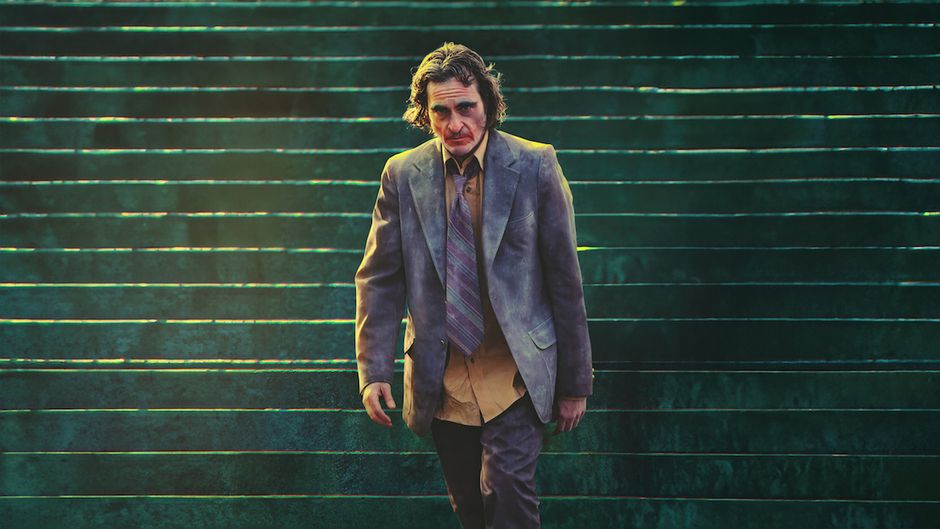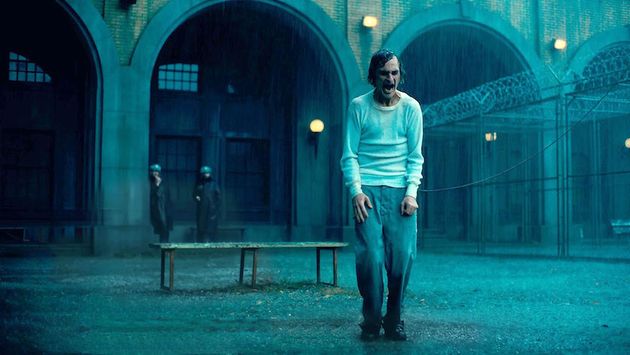Without our masks and characters, we are left with only ourselves, what we are, facing the only kind of “foolishness” we can afford: the gospel.
 Joaquin Phoenix already won the Best Actor Oscar for his performance as the Joker in Phillips' first film. / Screenshot from the film, HBO Max.
Joaquin Phoenix already won the Best Actor Oscar for his performance as the Joker in Phillips' first film. / Screenshot from the film, HBO Max.
The film about the Joker for which Joaquin Phoenix won the Oscar for Best Actor in 2020 had set the bar high.
A sensitive and tragic drama about the inner self of the anti-hero who, in my personal opinion, is the most captivating.
In a way, it was expected that director Todd Phillips' risky approach to the second part (Joker: folie à deux; Joker: madness for two), of making a musical with Lady Gaga in the cast, would not be as well received.
Although Phoenix is once again at ease in a role that elevated him to the highest recognition in Western cinema a few years ago, the realism of the tragedy is lost in the making of the musical scenes, which are an attempt to show and bring the process of madness suffered by the protagonists closer to the spectator.
In addition to the sadness of the misunderstanding and the impulsive ranting that portrayed the character in the first film in a touching way, there is now a love story marked by madness.
Or, at least, that is what the director seems to want us to believe, although in reality the romance between the Joker and Harley Quinn rather shows those insatiable instincts that drive us to the inertia of sin, and that live by feeding back on others.

Phillips keeps in his film that patina of, what one of the characters calls, “common sadness”.
And it is perhaps the most realistic feature in terms of the humanity of his Joker, or Arthur Fleck, who Phoenix, an actor accustomed to drama, plays so sensitively.
If it were not for the sign presiding over the fictional Arkham Asylum, you would think you were looking at yet another case of abuse in the controversial US prison system. Or yet another contemporary plea for the normalisation of mental health.
The truth is that Phillips is right to make sadness one of his assets, not only because he manages to make his Joker one of the closest to the viewer, but also because he points to that unwritten 'rule' of life that not even the fantasies of the most powerful superheroes or arch-villains can overcome.
Because, let's face it, we are sad creatures. And the concept of sin, understood as a failure in the task for which we were created and which has led us to live in error, brings much meaning to this.
While it is true that “by sorrow of countenance the heart shall be made right” (Ecclesiastes 7:3), when it comes to the repentance described in the gospel, we end up “consumed with sorrow” (Psalm 31:9), in a permanent lack of peace of mind.
The reactions to this are as diverse and unpredictable as they can be in the Joker film itself, where a constant trail of chaos makes it impossible to recognise stable joys or sorrows and everything falls apart easily. It is that shared madness, of all and for all.

[photo_footer]The film addresses the question of evil and our desperate attempt at self-justification. / Screenshot from the film, HBO Max. [/photo_footer]
Beyond the question of sadness, the second Joker film is all about the possible disorders that are used to explain the attitude of the character: dual personality, mental derangement, etc.
That is why the big moment will come in the form of a confession.
The key question is whether we are to bury the responsibility for our actions and decisions under the identity of another being that takes place in us momentarily and occasionally, or to assume it as our own.
The story plays with that dilemma: which mask will we use to avoid condemnation or at least make our attitude more attractive and justifiable.
Is that what happens to Arthur Fleck's sad face when the Joker's exaggerated smile appears on it?
Without our masks and characters, we are left with only ourselves, what we are, facing the only kind of “foolishness”, as Paul says (1 Corinthians 1:18), we can afford: the gospel.
In the face of such a verdict there is no excuse. Either we put on any mask to continue to be driven by this mad inertia of sin, which upsets everything, or we fall to our knees, unmasked before the truth that tells us that we are worthy of the death that evil brings, but that we can have a full life because of the guarantee of the gospel: that is, that someone else has taken our place in judgment; that it is Jesus who has climbed up to the cross where we deserved to die, to give us his presence for eternity and take us away from all chaos and sorrow and evil.

Las opiniones vertidas por nuestros colaboradores se realizan a nivel personal, pudiendo coincidir o no con la postura de la dirección de Protestante Digital.
Si quieres comentar o